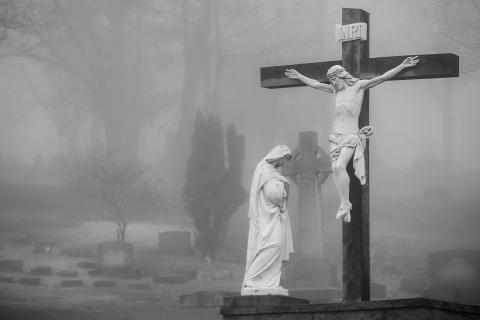
An intellectual, truth-centered perspective is often implicitly assumed in conversations between people who disagree about important matters. When arguing that abortion is reprehensible, for instance, one might cite numerous well-established scientific facts that prove life begins at conception: a genetically-distinct human being begins to exist almost instantaneously, develops a heartbeat in a matter of weeks, and on and on. When arguing about sexual difference, one might simply point to undeniable biological facts and expect that to solve the issue at hand.
This mode of thinking has continuity throughout the ages. Christianity, which maintains the healthy tension of faith and reason, has also long esteemed individual experience. But even individual experience must be contextualized within the larger reality in which we all live. (In contrast, an abortion advocate testified to Congress that men can get pregnant and that abortion is always to be defended due to a principle of bodily autonomy.)
Intellectual pursuits need common first principles; however, this fact has been cast aside in many current debates. In many debates, the therapeutic model has become primary, treating individual experience as normative and authoritative, discarding serious philosophic thought. It seems that we increasingly live in a (merely) therapeutic world, where phrases like “noncensus realities” are used instead of “psychosis,” and individuals are understood to have the ability to self-determine all things, including life and sex and human nature.
The silver lining to this overemphasized therapeutic vision of the world (which could be argued to border on narcissism) is that a society cannot be founded on it. It is impossible to create a society with such individualistic and manifestly contradictory theories of being. In response, it is reasonable to expect that those who seek to live in society will do so on firmer bases.
Before we can truly understand what is good and right for the human person, we must consider what the human person is. The Christian tradition gives us plenty to think about.
In the midst of renewed and often chaotic debate over the right to life, Kathryn Lopez offers a clarifying reminder: “Life is precious. One person’s life is unique and unrepeatable and worthy of protection. It’s okay to be grateful to be alive.”
A new book published in Poland explores the third pregnancy of Emilia Wojtyla, whose first doctor advised her to get an abortion due to potentially fatal complications. Instead, Wojtyla sought out a different doctor and resolved to sacrifice for her unborn child, if necessary. Her son, Karol, would grow up to be Pope St. John Paul II.
Regardless of how the Supreme Court will decide on the continuation of Roe v. Wade, the editorial board of the National Catholic Register notes how the work of advocating for life must still continue in earnest.
In her commencement address to graduates of Magdalen College, Mary Eberstadt shared the true story of a young woman’s conversion from non-religion to Catholicism, citing one crucial thing Catholicism offers: “I wanted what they had.”
In remarks delivered to graduates at the St. Charles Borromeo Seminary, Archbishop Charles Chaput offered a frank assessment of the differences between early Catholics – as well as early Protestant reformers – who died for their faith and the malleability with which we often live our Faith. “We need a new Pentecost. Remember that. Give your lives to that.”
Public school enrollment has plummeted in many parts of the country, a trend sped up by the pandemic but not reversed by school re-openings. Los Angeles Unified School District, which served 737,000 students two decades ago, currently serves 430,000 and projects that its enrollment will have shrunk by 30% nine years from now. In many districts, lowers enrollment has led to lower funding, complicating many districts’ plans to raise institutional quality.
At his most recent general audience, Pope Francis reflected on human suffering and God’s care, encouraging Christians to pray honestly to God: “God is not afraid of our prayer of protest.”


